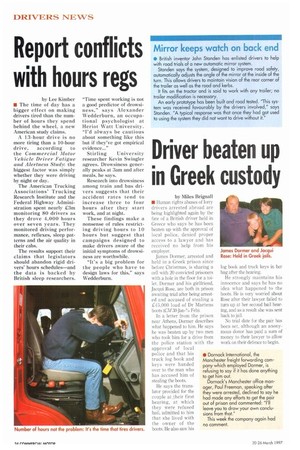Report conflicts with hours regs
Page 26

If you've noticed an error in this article please click here to report it so we can fix it.
by Lee Kimber • The time of day has a bigger effect on making drivers tired than the number of hours they spend behind the wheel, a new American study claims.
A 13-hour drive is no more tiring than a 10-hour drive, according to the Commercial Motor Vehicle Driver Fatigue and Alertness Study: the biggest factor was simply whether they were driving by night or day.
The American Trucking Associations' Trucking Research Institute and the Federal Highway Administration spent nearly £3m monitoring 80 drivers as they drove 4,000 hours over seven years. They monitored driving performance, reflexes, sleep patterns and the air quality in their cabs.
The results support their claims that legislators should abandon rigid drivers' hours schedules—and the data is backed by British sleep researchers. "Time spent working is not a good predictor of drowsiness," says Alexander Wedderburn, an occupational psychologist at Heriot Watt University. "I'd always be cautious about something like this but if they've got empirical evidence..."
Stirling University researcher Kevin Swingler agrees. Drowsiness generally peaks at 3am and after meals, he says.
Research into drowsiness among train and bus drivers suggests that their accident rates tend to increase three to four hours after they start work, and at night.
These findings make a nonsense of rules restricting driving hours to 10 hours but suggest that campaigns designed to make drivers aware of the initial symptoms of drowsiness are worthwhile.
"It's a big problem for the people who have to design laws for this," says Wedderburn.
















































































































